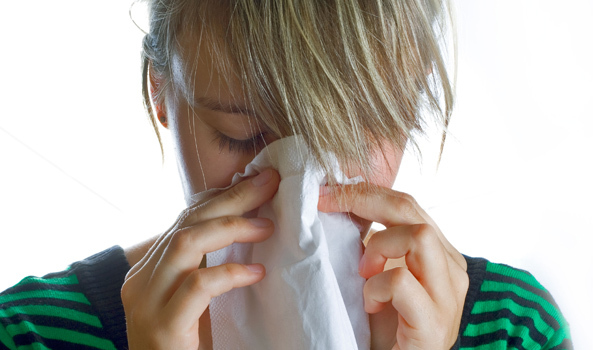How to Avoid Spreading the Flu

Holing up at home for four days when sick with the flu may be enough to avoid spreading the virus to others, a new study from France suggests.
On average, people with the flu are contagious for one day after they start having symptoms. Only 5 percent of flu sufferers are contagious for more than three days, the study found.
"We’re finding that individuals have very little remaining infectivity four days after their symptoms, so it would indeed be safe for [them] to go back to a normal life" at that point, said study researcher Anne Cori, of the Université Pierre et Marie Curie in Paris, who studies the spread of infectious diseases. Infectivity refers to the ability of an individual to infect another person if that other person is susceptible to the virus, Cori said.
Previous studies have estimated the contagious period of the flu to be anywhere from one day to eight days. According to the Centers of Disease Control and Prevention (CDC), people are contagious for up to five to seven days after they show symptoms.
Because it is virtually impossible to know for how long a person has the ability to infect others i based on observations alone, researchers use alternative methods to study this question. The new study examined information collected from lab experiments in which people were infected with the flu. The amount of virus in each person's nose at any given time was used to determine how infectious they were. This information was then plugged into a mathematical model to simulate disease spread.
The study also found that people who display symptoms of flu need to be isolated very quickly to avoid transmitting the disease.
The researchers estimate that, in a best-case scenario, a sick person could reduce the number of people he infects by 50 percent if he is isolated or treated within 16 hours of showing symptoms.
Sign up for the Live Science daily newsletter now
Get the world’s most fascinating discoveries delivered straight to your inbox.
This scenario assumes that people are not contagious until after symptoms emerge — an assumption that is sometimes made for research purposes, but does not always hold true in the real world. In fact, according to the CDC, most healthy adults may be able to infect people one day before symptoms appear.
Since it's very unlikely that a person would be isolated so quickly after showing symptoms, and thus could spread the flu without realizing it, a better way to control flu spread would be to also isolate or treat people who have had close contact with infected individuals, the researchers said.
Randy Wexler, a professor of family medicine at Ohio State University, said he generally tells people who have the flu that they are contagious for one to two days before they show symptoms. He also advises them to stay home for 24 hours after their fever goes away.
The best way to avoid catching the flu is to get a flu shot each year, according to the CDC. Frequent hand washing is also important for flu prevention, Wexler said.
The new study was published in the August issue of the journal Epidemics.
Pass it on: The spread of flu could be reduced if people are isolated shortly after they show symptoms, and stay home for four days.
This story was provided by MyHealthNewsDaily, a sister site to LiveScience. Follow Rachael Rettner on Twitter @RachaelRettner, or MyHealthNewsDaily @MyHealth_MHND. We're also on Facebook & Google+.

Rachael is a Live Science contributor, and was a former channel editor and senior writer for Live Science between 2010 and 2022. She has a master's degree in journalism from New York University's Science, Health and Environmental Reporting Program. She also holds a B.S. in molecular biology and an M.S. in biology from the University of California, San Diego. Her work has appeared in Scienceline, The Washington Post and Scientific American.










